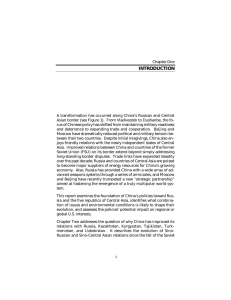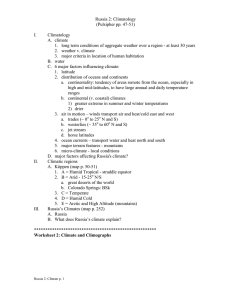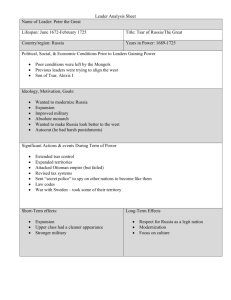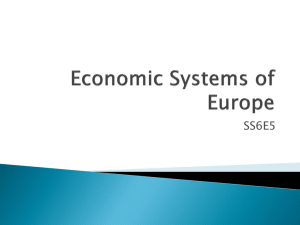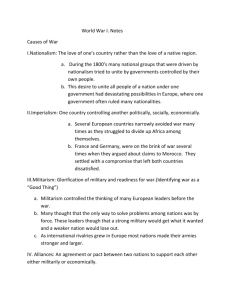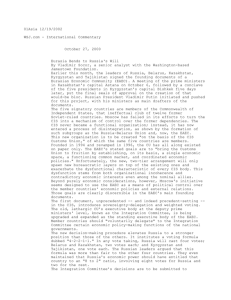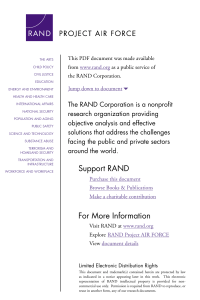Student Reaction to Alexander Cooley’s Presentation “The Price of Access:
advertisement
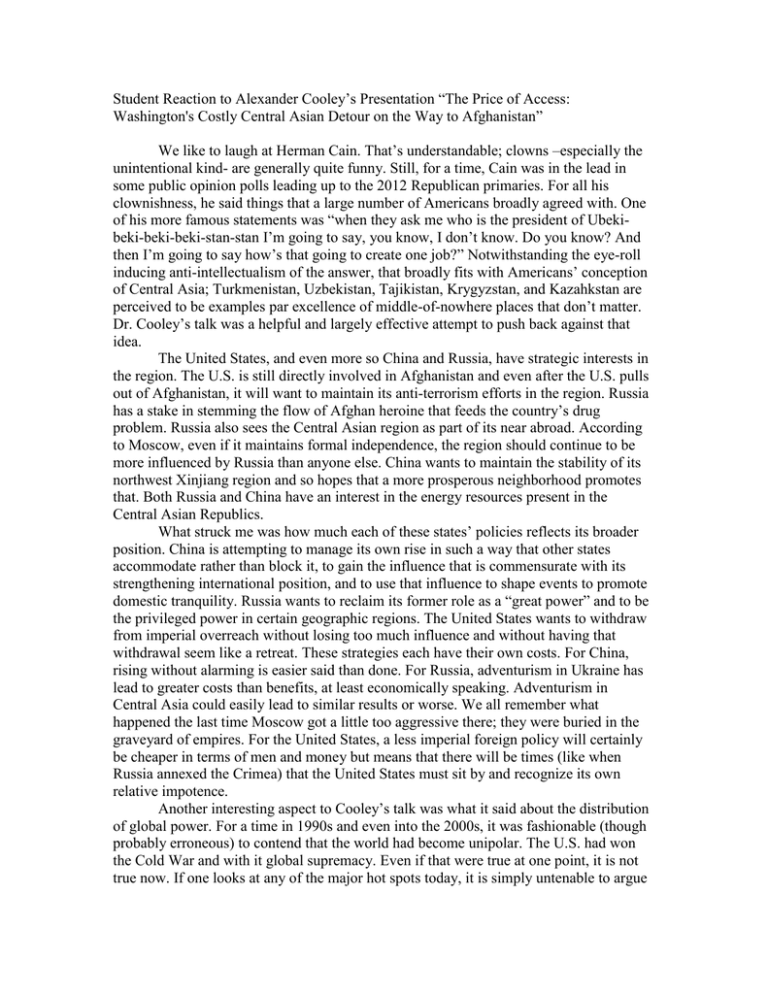
Student Reaction to Alexander Cooley’s Presentation “The Price of Access: Washington's Costly Central Asian Detour on the Way to Afghanistan” We like to laugh at Herman Cain. That’s understandable; clowns –especially the unintentional kind- are generally quite funny. Still, for a time, Cain was in the lead in some public opinion polls leading up to the 2012 Republican primaries. For all his clownishness, he said things that a large number of Americans broadly agreed with. One of his more famous statements was “when they ask me who is the president of Ubekibeki-beki-beki-stan-stan I’m going to say, you know, I don’t know. Do you know? And then I’m going to say how’s that going to create one job?” Notwithstanding the eye-roll inducing anti-intellectualism of the answer, that broadly fits with Americans’ conception of Central Asia; Turkmenistan, Uzbekistan, Tajikistan, Krygyzstan, and Kazahkstan are perceived to be examples par excellence of middle-of-nowhere places that don’t matter. Dr. Cooley’s talk was a helpful and largely effective attempt to push back against that idea. The United States, and even more so China and Russia, have strategic interests in the region. The U.S. is still directly involved in Afghanistan and even after the U.S. pulls out of Afghanistan, it will want to maintain its anti-terrorism efforts in the region. Russia has a stake in stemming the flow of Afghan heroine that feeds the country’s drug problem. Russia also sees the Central Asian region as part of its near abroad. According to Moscow, even if it maintains formal independence, the region should continue to be more influenced by Russia than anyone else. China wants to maintain the stability of its northwest Xinjiang region and so hopes that a more prosperous neighborhood promotes that. Both Russia and China have an interest in the energy resources present in the Central Asian Republics. What struck me was how much each of these states’ policies reflects its broader position. China is attempting to manage its own rise in such a way that other states accommodate rather than block it, to gain the influence that is commensurate with its strengthening international position, and to use that influence to shape events to promote domestic tranquility. Russia wants to reclaim its former role as a “great power” and to be the privileged power in certain geographic regions. The United States wants to withdraw from imperial overreach without losing too much influence and without having that withdrawal seem like a retreat. These strategies each have their own costs. For China, rising without alarming is easier said than done. For Russia, adventurism in Ukraine has lead to greater costs than benefits, at least economically speaking. Adventurism in Central Asia could easily lead to similar results or worse. We all remember what happened the last time Moscow got a little too aggressive there; they were buried in the graveyard of empires. For the United States, a less imperial foreign policy will certainly be cheaper in terms of men and money but means that there will be times (like when Russia annexed the Crimea) that the United States must sit by and recognize its own relative impotence. Another interesting aspect to Cooley’s talk was what it said about the distribution of global power. For a time in 1990s and even into the 2000s, it was fashionable (though probably erroneous) to contend that the world had become unipolar. The U.S. had won the Cold War and with it global supremacy. Even if that were true at one point, it is not true now. If one looks at any of the major hot spots today, it is simply untenable to argue that there are not at least two, and in the case of Central Asia three, states vying for regional influence. The United States is unquestionably stronger than Russia on a global scale but Central Asia is not the globe, it is Russia’s backyard. It has been argued that one of the reasons that the Kennedy Administration favored a naval blockade during the Cuban Missile Crisis was that if there had to be a military confrontation between the United States and the Soviet Union then the most favorable conditions for the United States that could be imagined would be a naval engagement in the Caribbean. Conversely, the most unfavorable location for America to attempt to control events today is Central Asia. Other powers are much closer geographically, culturally, and politically. Given this, American officials would do well to remember Gibbon’s maxim that “there is nothing more contrary to nature than the attempt to hold in obedience distant provinces.” Finally, to return to Herman Cain’s ill-made point, if the single biggest issue for an American President is how to create more good jobs –and in the current context it would be difficult to argue that it is something else- then the worst possible policy for the United States to adopt vis-à-vis the Central Asian Republics would be one that needlessly provokes China, one of our most important trading partners. The combined GDP of Turkmenistan, Uzbekistan, Tajikistan, and Kyrgyzstan is smaller collectively than that of Arkansas and given that they are landlocked and on the other side of the planet the potential for lucrative job-creating trade between them and the United States amounts to a rounding error in the potential for trade between the United States and China. It is also not automatic that a growing role for China in Central Asia (or for that matter the world) is somehow bad for the United States. Two of the three evils that China wants to combat are terrorism and extremism; how can the United States be opposed to that? China also wants to gain access to Central Asian energy supplies; greater global supply- all other things being equal- lowers global prices….lower global energy prices hurt the United States how exactly? So Central Asia does matter because it is one arena where Chinese, American and Russian foreign policies meet. The importance of that meeting cannot be missed, even by the likes of Herman Cain.

